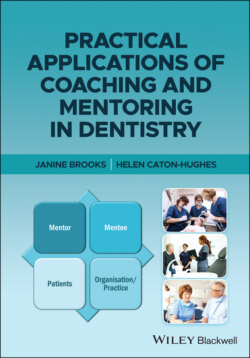Читать книгу Practical Applications of Coaching and Mentoring in Dentistry - Janine Brooks - Страница 34
Ethics
ОглавлениеSuccessful mentoring relationship are built on solid ethical foundations. Ethical practice underpins mentoring.
Ethics describes standards of what is morally right and wrong, good and bad, that classify what people should do and how they should act.
It's about moral choices, the values that lie behind those choices, the reasons why people make the choices they make and the language people use to describe their choices.
Ethical behaviour in mentoring is focused on the ethics of the relationship between the mentor and mentee.
Coaches and mentors of South Africa (COMSA) (2015) have produced an ethics toolkit, which suggests four areas of potential legal or ethical problems for mentors. These are: Boundaries, Confidentiality, Competence, and Dependency.
Ethical behaviours will be very familiar to dental professionals: honesty, trust, integrity, compassion, respect, empathy. They are the behaviours we demonstrate in caring for and treating our patients.
Of course, mentoring is a reciprocal relationship, so it is just as important that the mentee maintains ethical behaviour toward their mentor.
Table 2.2 Ethical checklist, COMSA.
| Boundaries | Am I clear about my boundaries and are they in line with my values and beliefs? Have I established my client's boundaries? |
| Confidentiality | Am I prepared/able to maintain complete confidentiality? Are there issues which may potentially require a breach of confidentiality? Have these possibilities been discussed? (i.e. in the case of law‐breaking, abuse, or organisational requirements) |
| Competence | Am I fully aware of the requirements of the coaching assignment? Am I fully aware of the needs of my client regarding expected outcomes? Do I have the requisite skills, knowledge, and experience to be able to assist the client? Am I prepared to refer the client to someone who is more capable to help them, if the need arises? Do I need to refer to a supervisor to ensure that I am able to provide the necessary competence? |
| Dependency | Am I encouraging the client to extend the process unnecessarily? Do I discourage the client from forming a reliance on my input? Is there a clear determination of expected outcomes and a consequent end to the process? |
Openness and transparency are ethical considerations, as is trust. Trust is the confident belief in and reliance on the moral character and competence of another person. It's a confidence that another person, in this case the mentor, will act with the right motives and in accordance with their professional norms. Mutual trust is vital to, and underpins, the mentor/mentee relationship.
Integrity can be demonstrated by soundness of judgment, reliability, and being faithful to moral norms. A lack of integrity can be manifest as, hypocrisy, insincerity, bad faith, and self‐deception.
Confidentiality is important to the mentoring relationship. The mentee needs to know that their conversations will be held confidentially and that information will not be disclosed by the mentor to another person without the mentee's consent.
The mentoring relationship is subject to the same confidentiality as that between dental professional and patient. This means that only in very exceptional circumstances, for example where the mentee reveals behaviour that places patients or other persons at serious risk of harm would the mentor be legally and morally obliged to disclose information. Hopefully these type of circumstances would be rare.
Mentors are role models and they have a responsibility for ensuring that their behaviour is ethical. Beneficence means to act to bring benefit to another and the ethical mentor acts for the benefit of the mentee, in their best interests. They also act in a way that doesn’t cause harm (non‐maleficence’).
Mentors must be careful not to make misleading claims about their competence, qualification, or accreditation as a mentor. Their behaviour at all times must be fair and without discrimination, showing respect for their mentee as an individual.
The philosopher Immanuel Kant (1724–1804) said that rational human beings should be treated as an end in themselves, and not as a means to something else. In terms of the mentoring relationship this means that the mentor should not treat the mentee or the relationship solely for their (the mentors') own gain.
The mentoring relationship can be a very close relationship with often personal and private information being shared. It's important that professional boundaries are maintained and not crossed.
This can include personal boundaries, but also conflicts of interest where either the mentor or the mentee uses the relationship to gain inside information or an unfair advantage over other people. Both the mentor and the mentee need to feel ‘safe’ that the relationship is about mentoring and not about something else, there must be no hidden agendas.
